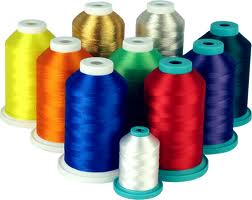thread
英 [θred]
美 [θred]
- n. 线;螺纹;思路;衣服;线状物;玻璃纤维;路线
- vt. 穿过;穿线于;使交织
- vi. 通过;穿透过
使用频率:

中文词源
thread 线,线索,脉络
来自古英语 thraed,线,绳索,来自 Proto-Germanic*threduz,纺线,编线,来自 PIE*tere,弯, 转,编织,词源同 turn,throw.引申词义线索,脉络等。
英语词源
- thread
-
thread: [OE] A thread is etymologically something ‘twisted’. The word comes from a prehistoric Germanic *thrǣthuz, which was derived from the base *thrǣ- ‘twist’ (source also of English throw). Other descendants of *thrǣthuz include Dutch draad, Swedish tråd, and Danish traad ‘thread’ and German draht ‘wire’.
=> throw - thread (n.)
- Old English þræd "fine cord, especially when twisted" (related to þrawan "to twist"), from Proto-Germanic *thredu- "twisted yarn" (cognates: Old Saxon thrad, Old Frisian thred, Middle Dutch draet, Dutch draad, Old High German drat, German Draht, Old Norse þraðr), literally "twisted," from suffixed form of PIE root *tere- (1) "to rub, rub by turning, turn" (see throw (v.)). Meaning "spiral ridge of a screw" is from 1670s. Threads, slang for "clothes" is 1926, American English.
The silk line, as spun by the worm, is about the 5000th part of an inch thick; but a spider's line is perhaps six times finer, or only the 30,000th part of an inch in diameter, insomuch, that a single pound of this attenuated substance might be sufficient to encompass our globe. [John Leslie, "Elements of Natural Philosophy," Edinburgh, 1823]
- thread (v.)
- "to put thread through a needle," mid-14c., from thread (n.); in reference to film cameras from 1913. The dancing move called thread the needle is attested from 1844. Related: Threaded; threading.
权威例句
- 1. A thin, glistening thread of moisture ran along the rough concrete sill.
- 在粗糙不平的水泥窗台上有一条细细的发光水印。
- 2. She idly pulled at a loose thread on her skirt.
- 她无聊地扯着裙子上一根松掉的线头。
- 3. A ratchet mechanism transfers the thread from spool to bobbin.
- 一种棘齿装置把线从线轴转到梭心上。
- 4. I sit down, thread a needle, snip off an old button.
- 我坐下来,穿好针,剪下一枚旧纽扣。
- 5. Wipe the mushrooms clean and thread them on a string.
- 把这些蘑菇擦干净,然后用线穿起来。